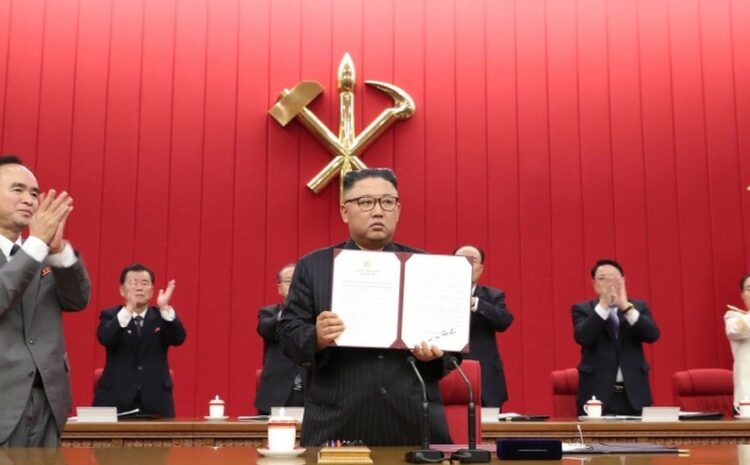
IMAGE COPYRIGHT EPA
This marks the first time Mr Kim has directly commented on President Joe Biden’s administration.
North Korea had earlier snubbed efforts by the new US government to establish diplomatic communication.
The US has been calling for North Korea to give up its nuclear weapons.
But Pyongyang has repeatedly refused, and the United Nations Security Council has imposed strict economic sanctions on the East Asian state for its nuclear tests.
Mr Kim made his latest remarks at a meeting of senior leaders which started this week in the capital Pyongyang.
He also said North Korea would “sharply and promptly” react to any developments and “concentrate efforts on taking stable control of the situation on the Korean peninsula”.
Earlier this week leaders from the G7 nations, including Mr Biden, called on North Korea to abandon its nuclear and missile programme and resume dialogue.
A fraught relationship
Mr Kim’s relationship with Mr Biden’s administration has so far been fraught with tension.
Prior to the US election, Mr Biden had called Mr Kim a “thug”, and days before Mr Biden’s inauguration, North Korea put on a show of force with a massive military parade that showcased a new missile.
In April Mr Biden referred to North Korea as a “serious threat” to global security, prompting an angry response from Pyongyang which said the statement reflected Mr Biden’s intent to “keep enforcing the hostile policy” towards the country.
Washington also recently completed a review of its North Korea policy and said that the US would continue to aim for the eventual complete denuclearisation of the Korean peninsula.
Mr Biden has promised an approach marked by diplomacy and “stern deterrence”.
White House press secretary Jen Psaki said that “our policy will not focus on achieving a grand bargain, nor will it rely on strategic patience”.
The US would instead pursue a “calibrated practical approach that is open to and will explore diplomacy with” North Korea, she said, adding it would focus on making “practical progress”.
Mr Kim had previously met Mr Biden’s predecessor Donald Trump on three occasions, but talks on denuclearisation eventually stalled.
“The administration has not offered a detailed roadmap because it wants flexibility to engage Pyongyang when and where progress can be made,” he said.
“Meanwhile, Washington will strengthen deterrence by coordinating strategies, military training, and missile defences with allies.”

Analysis by Nari Kim, BBC Korean Service
Kim Jong Un’s seemingly mixed message of preparing for “dialogue and confrontation” mirrors remarks by President Biden, who characterised the US approach to North Korea as “diplomacy and stern deterrence”.
By sending out both messages, North Korea is sticking to a kind of wait-and-see strategy with regard to the new US administration. But behind the ambiguity of Kim’s message is also a signal that North Korea is willing to return to talks.
And although Kim stressed preparation for “confrontation”, he refrained from direct criticism of the US or other provocative remarks.
One key factor behind that might be North Korea’s domestic food insecurity and concerns over the coronavirus pandemic. The country’s economy has been battered by tough international sanctions over its nuclear programme and strict border closures against the spread of the pandemic.
So the message here is really the status quo – North Korea is signalling its openness to dialogue, but it will not accept the complete denuclearisation demanded by the US. And in the short term, the spread of Covid-19 and food insecurity may put its focus much more at home than abroad.
